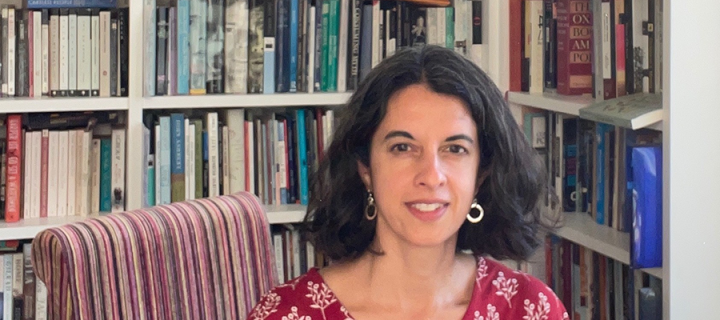Understanding Poetry
Dr Reena Sastri tells us what she loves about poetry and why you should take her class to ignite your passion.
Have you ever wanted to take a short course in poetry but were unsure of whether this was the course for you? Read Dr Reena's heartfelt thoughts below on why she loves poetry and why it is a memorable language for so many.
We asked Reena to tell us about what poetry means to her:

What I love about poetry is how poets use language - the language we use when messaging a friend, writing a shopping list, or talking about the weather - in creative and surprising ways that can offer us new ways of thinking about the world and our own experiences.
Emily Dickinson advised herself and other poets to ‘Tell all the truth but tell it slant—'. The slants that poets put on truths, emotions, or situations, light them up from new angles, revealing something we’ve never seen before. Most feelings aren’t reducible to an emoji (no matter how many of these pop up on our screens!). And many of our thoughts are tangled, or contradictory.
Poetry excels in what A. R. Ammons called ‘complexity without confusion’; it can, as John Keats said, hold us ‘in uncertainties, mysteries, doubts, without any irritable reaching after fact and reason.’ There are things we don’t need to, indeed can’t, be certain about, or measure, or put into a graph or a spreadsheet.
Poetry provides a place for the unique texture of our thoughts and feelings. It offers a space for contemplation, for testing alternative ideas, and for exploring paradoxes and oxymorons—phrases and ideas that seem to contradict themselves, yet cannot be reduced to one side or the other.
Poem 1 - I dwell in Possibility
Dickinson pointed to this aspect of poetry in her short poem beginning ‘I dwell in Possibility—':
I dwell in Possibility –
A fairer House than Prose –
More numerous of Windows –
Superior – for Doors –
The ‘house’ of ‘Possibility,’ ‘Superior’ to ‘Prose,’ is poetry, an alternative way of writing—one that uses line breaks, rhyme, rhythm, and metaphor (like the ‘house’), rather than only grammatical sentences, to structure thoughts. At the end of the poem Dickinson says her ‘Occupation’ (her pastime, but also her way of occupying the house), is ‘The spreading wide my narrow Hands / To gather Paradise –’. A poem, especially one with lines as short as Dickinson’s, is literally ‘narrow’ when compared to a paragraph of prose writing. But for Dickinson, that compression paradoxically enables it to encompass the farthest reaches of imagination and joy.
Poem 2 - If She Only Had One Minute
Contemporary poet Kay Ryan also explores how small can become large:
If She Only Had One Minute
What would she put in it?
she wouldn’t put she thinks;
she would take,
suck it up
like a deep lake— ……………………..
feast on everything she
had released, dismissed,
or pushed away; she would make
room and room … ……………………….
on the last minute of the last day
she would drink and have it; ballooning
like a gravid salmon or the moon.
Ryan takes the common phrase ‘If you have a minute’—a polite way to ask a colleague, or a spouse, for a favor—or ‘If I only had a minute,’ an expression of frustration with our scheduled lives—and emphasizes the word ‘only’: if I had only a minute left on earth. The opening rhyme, ‘minute’ and ‘in it,’ makes us smile, but the subject is serious: can we imagine drinking this deeply of life, being unashamed to ‘balloon’? Through comparisons, Ryan makes that swelling both earthly (the gravid salmon) and celestial (the moon); maybe in our final minute, we will be both.
Tell us why we should take a short course in poetry:
A poem ‘can stop you in your tracks, can show you things you had not seen, can make you think, can make you joyful, uncomfortable, or angry’ (as recent critics write)—and all in the time it takes to read a social media post, or a message on your newsfeed. Poetry, as W. H. Auden put it, is memorable language: that poem might stay with you longer, nourish you more deeply, and open up your own possibilities.
What courses are available?
We have a short courses available in Poetry in Term 1, book by 21st September!

